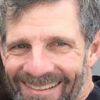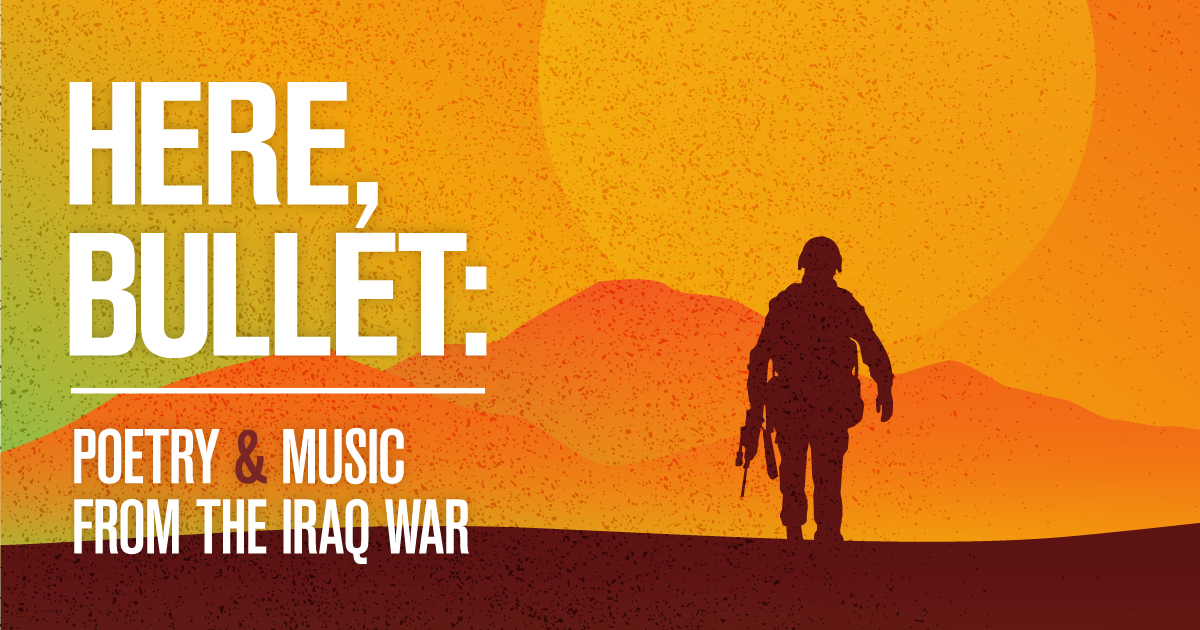An interview with Brian Turner and Reginald Unterseher
This month will be the twentieth anniversary of the beginning of the Iraq War. How has the experience of war affected the veterans of Iraq and Afghanistan? How has it affected us?
Eight years ago, the Mid-Columbia Mastersingers, with guest tenor Les Green, premiered composer Reginald Unterseher’s seven-song cycle from poet Brian Turner’s book Here, Bullet. I was honored to be part of the chorus. As singers, we try not to let our emotions affect our performance, but I struggled as we sang such deeply moving poetry and music. On March 24, Brian Turner will be joining us in an expanded program that will include spoken word, music, and small group veteran discussions.
I interviewed Brian and Reg about their work, the poetry and music that brought them together, and the event itself.
Brian, let me start with you. For our readers who don’t know you, tell me something about you or your poetry that will give them a sense of the source of your writing and how that may be reflected in their experience at this event.
Brian Turner: I’m originally from the San Joaquin Valley in California, a valley I consider one of the well-springs of poetry in America, with a long and ongoing tradition of poetry. The landscape I was raised in was isolated and austere, with a kind of minimalism to it that helped shape my imagination. I think my work has a cinematic quality to it, as I’m drawn to images and to moments in time that are layered in complexity. I’m also a lover of music (I play the flugelhorn and bass guitar), and so my love of music spills over into my writing practice, too — and it’s one of the reasons why I enjoy collaborating with Reg.
Regardless of subject, my work seems always to be rooted in an evergreen conversation on love and loss.
Reg, what was it that attracted you to Brian’s work, and what was your source of inspiration as you went to work setting his powerful language to music?
Reginald Unterseher: I am always looking for poetry, whether I have a composing project in mind or not. I especially look for poetry about nature and current events, and Brian’s poetry is all of that. I first heard of his work through an NPR story soon after Here, Bullet was published in 2005, and I got a copy of the book as soon as I could.
These poems had such a visceral impact on me. I feel them in my body, just as I do his new poem “On This Harvest Moon,” though in a very different way. One of the things that struck me immediately was how the scenes could go from the brutality of war to calm scenes of the countryside, that all of that can exist at the same time. I did not have a commission for the Here, Bullet settings, but it was one of the few projects in my career where I just had to write the music, whether I thought anybody would ever sing them or not. Choosing which poems for the cycle took some time, too. I needed to find the shape, a storytelling process that could not include the whole book; find a beginning, middle and end; think of it as a performer/listener experiencing it in real time rather than reading the poems in their own time. I also had to decide whether to include some of the most graphic poems in the book or not. I decided to include them, and some have chosen not to perform the cycle because of that.
Brian, you wrote much of your first book of poetry, Here, Bullet, while you were serving with a Stryker brigade during the Iraq War almost twenty years ago. Has your perspective on war changed in the two decades since?
Brian: I don’t believe my perspective has changed so much as simply deepened or matured, though I find myself surprised and somewhat disheartened more than I was when I first returned from Iraq. I’ve traveled the country quite a bit this past fall, asking strangers that I meet in small towns across America: “What have we learned from the wars in Iraq and Afghanistan? What did they mean to us?” And no one seems to know. I’m not even sure it’s a question that registers. It feels like the door to recent wars overseas has shut very quietly behind us, and I’m wondering — as a nation, what did these experiences mean to us? What have we learned?
Recent veterans of the War in Afghanistan are a generation younger than you were in Iraq, and our country has changed since 2003. In your conversations with younger veterans, do you find that the experience of combat on a soldier is universal?
Brian: Each veteran has a unique and signature experience during their time in uniform, whether they served in Iraq or Afghanistan or Vietnam or [insert name of war/conflict]. And yet, once we start sharing our stories, soon enough the echoes of experience find their way into the conversation, and we often recognize ourselves in one another. The landscapes may differ. The equipment and gear will certainly change. The circumstances that lead each person to carry a rifle may differ, too. But the constants remain. Fear. Anxiety. Dread. Boredom. Shame. Beauty. Surprise. Perseverance. Exhaustion. Love and loss. The list goes on and on.
Inside of history, inside of a war, inside each uniform — we find a human being.
Reg, as someone who did not serve in the military, how do you get your mind around the emotions and imagery that Brian’s poems evoke?
Reg: I just listen to the words, feel what I feel, and let that suggest an atmosphere, a feeling, and a sound. They are so clear and strong. I feel like I’m just shining a light on his words, and hope I present them clearly. When I read his poems, they evoke tastes and smells, weather, plant and animal life, a whole physical, sensory experience in space and time. I do my best to set these words as simply as possible. I don’t think they need ‘amplification’ — just to be heard. Part of how I choose poems is how they taste and feel as you say the words out loud; that is what tells me if a musical setting can work or not.
What is it like working with Reg as a composer?
Brian: One of the things I admire about Reg is his ability to visualize a story and transpose experience into music. During our conversations for this event, for example, we talked about how to structure the experience, and I appreciated the ebb and flow of his collaborative style — as he suggested an initial set of ideas and then left room for others to shape the event, etc. In this way, we were able to bounce ideas off each other until the event made sense as a cohesive whole, as a larger experience composed of several disparate parts. I think we both felt an instinctual need to turn to art as a way to reflect on wartime experience, and that by sharing this we might take part in something that’s necessary in a larger, communal sense.
Participating in events like this one, giving interviews, attending book signings — all of those things require you to revisit your experiences again and again. How do you navigate that? Does it get any easier over time?
Brian: I think the cumulative nature of this practice has been healthy and beneficial to me on a personal level. The writing of the poems in my first book (Here, Bullet) didn’t prove to be cathartic at the time — as I wrote them while in a combat zone, and the poems didn’t stop the war from trudging on around me. That said, I only read poems now that continue to exert a kind of internal work within me, as I believe in the [Robert] Frost maxim: “No tears in the writer, no tears in the reader. No surprise for the writer, no surprise for the reader.” So, if I’m no longer learning from a poem, then I no longer share it with others at readings. That’s one of my fundamental rules as a writer, as an artist, and as a human being. If I’m going to share a poem I’ve written with another person, then it must be something that’s still doing work inside of me, too.
Describe the event Here, Bullet: Poetry & Music from the Iraq War. What should attendees expect to experience?
Reg: It is an evening of spoken word, music, and small group conversation that moves through the life experiences of a soldier in country, then of the veteran coming home, and then of love and loss. The first section features musical performances of seven poems from Here, Bullet sung by tenor Les Green, with Ben Wally at the piano and the Mid-Columbia Mastersingers. The second section features a setting of “Phantom Noise” by Jake Runestad, for choir and piano, from his symphonic work Dreams of the Fallen. The last section will include the premiere of a new setting of an as-yet-unpublished poem, “Upon This Harvest Moon,” for unaccompanied chorus.
I think it is important to note that the language you will hear does not hold anything back. Nothing is here just for shock value, though. The subject matter ranges from the intense and graphic to the sublimely beautiful. It is just the reality of the situations, clearly presented. It includes a soldier suicide and a scene inside a medical unit. These are things we often gloss over here at home, and here they are brought out in the open with unflinching clarity.
The connection between people in real time in the same room is something very special, which is why live performance is so important. Brian and I have never met in person before; I am so thrilled he will be here.
Is there anything else you’d like to say?
Reg: This event came about because I had made a score video of “To Sand,” posted it on social media last fall, and tagged Brian. He told me that March 20, 2023 would be the 20th anniversary of the beginning of the Iraq War, and we wanted to mark it somehow. That conversation led to a lot more conversations, and now he is coming here! I am so grateful to all of the people who are supporting us — people from the Mastersingers and the Arts Foundation of the Mid-Columbia. It’s never as simple as Brian and I wanting to do something and ‘poof’ it magically appears. Quite a few folks have worked very hard to make it possible, especially in the shorter time frame than we usually have to plan events. I am also grateful to Shalom UCC for making a performance space available to us, with full knowledge of the subject matter.
Here, Bullet: Poetry & Music from the Iraq War is Friday, March 24, 2023, 7 p.m.
Shalom UCC 505 McMurray, Richland. Free to attend, donations welcome.
Content Warning: may not be suitable for all audiences. Features graphic depictions of war and explicit language.
Sponsored by Arts Foundation of the Mid-Columbia, Mid-Columbia Mastersingers, and Amentum
Ted Miller grew up around the world but now lives in Richland with his wife. He’s a runner, actor, singer, nuclear engineer, and graduate of the U.S. Naval Academy. Ted believes that if more people worked toward love and understanding instead of giving in to fear and divisiveness, the world would be a better place. tedmiller.net
Ted Miller has been part of the local performing arts scene for over 25 years. He currently serves as president of the Washington State Community Theatre Association.


